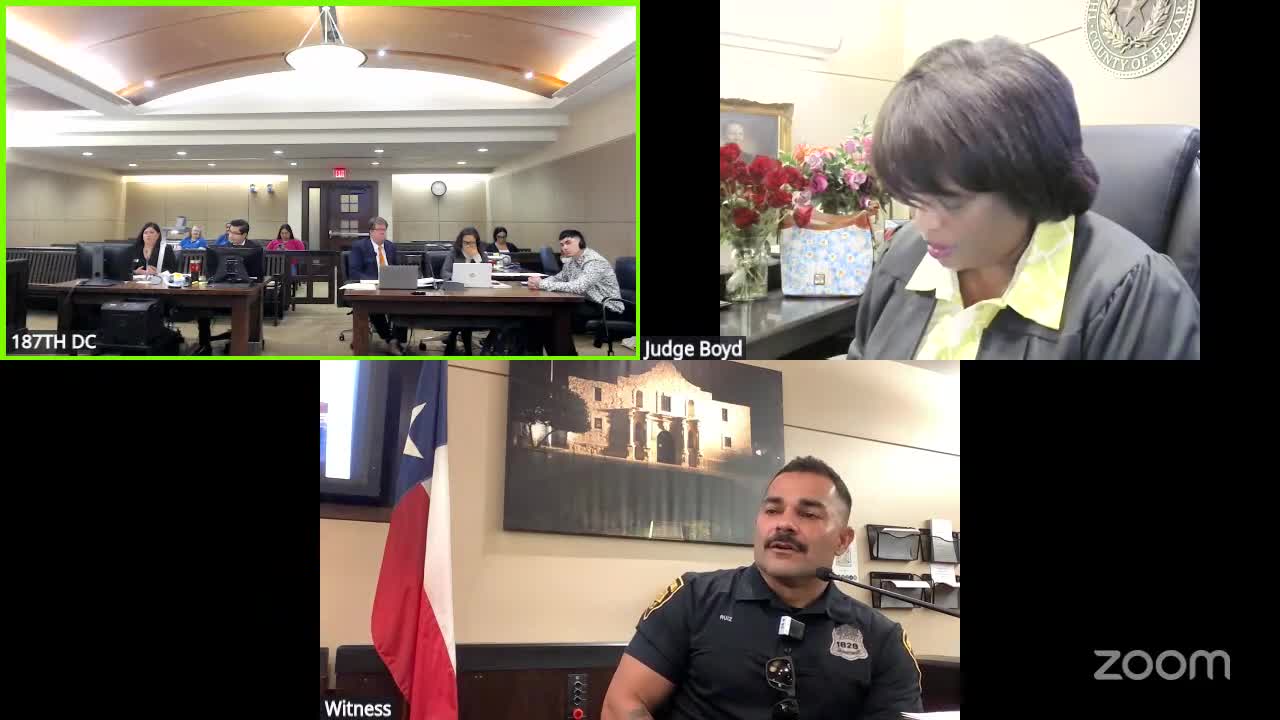Officers Marchand and Veithia Manage Bexar County Family Violence Call Investigation
August 02, 2025 | Judge Stephanie Boyd 187th District, District Court Judges, Judicial, Texas
This article was created by AI summarizing key points discussed. AI makes mistakes, so for full details and context, please refer to the video of the full meeting. Please report any errors so we can fix them. Report an error »

In a recent court session held on August 1, 2025, Judge Stephanie Boyd presided over the case of State vs. Cepedes, where critical discussions emerged regarding the handling of a family violence incident involving language barriers. The testimony highlighted the challenges faced by law enforcement when communicating with non-English speaking victims.
During the proceedings, an officer detailed the steps taken to ensure effective communication with a Spanish-speaking complainant. The officer explained that, due to a language barrier, they requested the assistance of two Spanish-speaking officers, Marchand and Vethia, to facilitate accurate information gathering. This decision was crucial, as the nature of the incident required detailed questioning to ensure the safety of all parties involved.
The officer elaborated on the investigative process, noting that while the Spanish-speaking officers conducted interviews, they also coordinated with Crime Scene Investigators (CSI) to document evidence. This collaborative approach aimed to ensure that all necessary information was collected efficiently and accurately, reflecting the seriousness of the family violence call.
As the investigation progressed, the officers moved to a secondary location to gather further information about the suspect, demonstrating a proactive approach to ensure the safety of the complainant and the community. The officer emphasized the importance of thorough documentation and adherence to policy, including providing the complainant with victim's rights information and necessary forms.
This case underscores the critical need for effective communication in law enforcement, particularly in situations involving vulnerable populations. The court's focus on these procedural details highlights the ongoing efforts to improve responses to domestic violence incidents and ensure that all victims receive the support and protection they deserve. As the case continues, the implications for community safety and law enforcement practices remain significant.
During the proceedings, an officer detailed the steps taken to ensure effective communication with a Spanish-speaking complainant. The officer explained that, due to a language barrier, they requested the assistance of two Spanish-speaking officers, Marchand and Vethia, to facilitate accurate information gathering. This decision was crucial, as the nature of the incident required detailed questioning to ensure the safety of all parties involved.
The officer elaborated on the investigative process, noting that while the Spanish-speaking officers conducted interviews, they also coordinated with Crime Scene Investigators (CSI) to document evidence. This collaborative approach aimed to ensure that all necessary information was collected efficiently and accurately, reflecting the seriousness of the family violence call.
As the investigation progressed, the officers moved to a secondary location to gather further information about the suspect, demonstrating a proactive approach to ensure the safety of the complainant and the community. The officer emphasized the importance of thorough documentation and adherence to policy, including providing the complainant with victim's rights information and necessary forms.
This case underscores the critical need for effective communication in law enforcement, particularly in situations involving vulnerable populations. The court's focus on these procedural details highlights the ongoing efforts to improve responses to domestic violence incidents and ensure that all victims receive the support and protection they deserve. As the case continues, the implications for community safety and law enforcement practices remain significant.
View full meeting
This article is based on a recent meeting—watch the full video and explore the complete transcript for deeper insights into the discussion.
View full meeting
